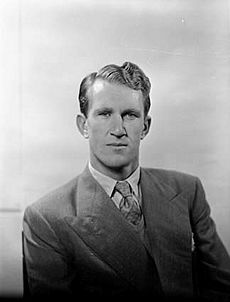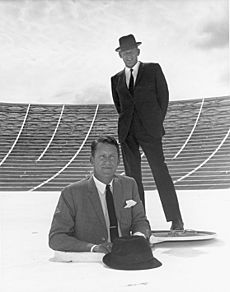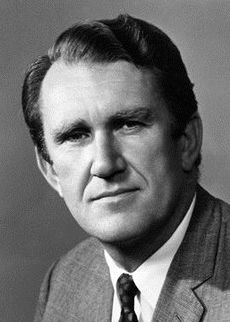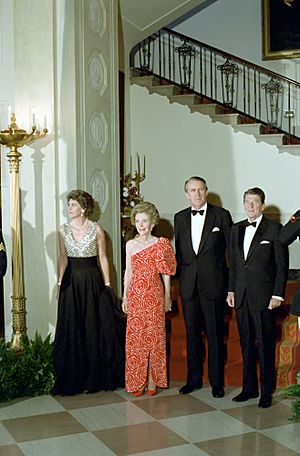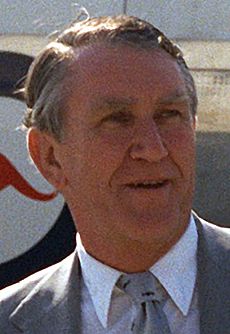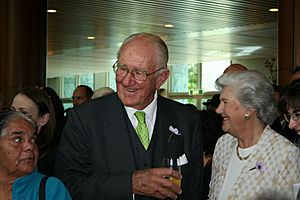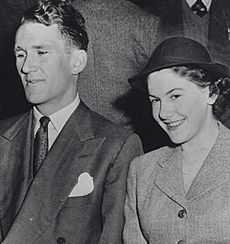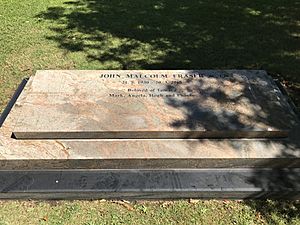Malcolm Fraser facts for kids
Quick facts for kids
Malcolm Fraser
|
|
|---|---|
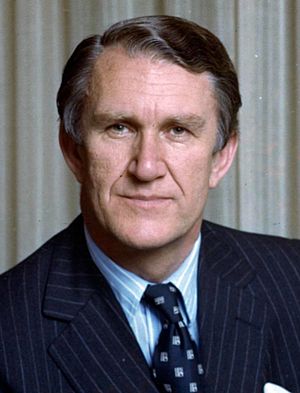
Official portrait, 1977
|
|
| 22nd Prime Minister of Australia | |
| In office 11 November 1975 – 11 March 1983 |
|
| Monarch | Elizabeth II |
| Governor-General |
|
| Deputy | Doug Anthony |
| Preceded by | Gough Whitlam |
| Succeeded by | Bob Hawke |
| Leader of the Liberal Party | |
| In office 21 March 1975 – 11 March 1983 |
|
| Deputy |
|
| Preceded by | Billy Snedden |
| Succeeded by | Andrew Peacock |
| Leader of the Opposition | |
| In office 21 March 1975 – 11 November 1975 |
|
| Prime Minister | Gough Whitlam |
| Deputy | Phillip Lynch |
| Preceded by | Billy Snedden |
| Succeeded by | Gough Whitlam |
| Minister for Education and Science | |
| In office 20 August 1971 – 5 December 1972 |
|
| Prime Minister | William McMahon |
| Preceded by | David Fairbairn |
| Succeeded by | Gough Whitlam |
| In office 28 February 1968 – 12 November 1969 |
|
| Prime Minister | John Gorton |
| Preceded by | John Gorton |
| Succeeded by | Nigel Bowen |
| Minister for Defence | |
| In office 12 November 1969 – 8 March 1971 |
|
| Prime Minister | John Gorton |
| Preceded by | Allen Fairhall |
| Succeeded by | John Gorton |
| Minister for the Army | |
| In office 26 January 1966 – 28 February 1968 |
|
| Prime Minister |
|
| Preceded by | Jim Forbes |
| Succeeded by | Phillip Lynch |
| Member of the Australian Parliament for Wannon |
|
| In office 10 December 1955 – 31 March 1983 |
|
| Preceded by | Don McLeod |
| Succeeded by | David Hawker |
| Personal details | |
| Born |
John Malcolm Fraser
21 May 1930 Melbourne, Victoria, Australia |
| Died | 20 March 2015 (aged 84) Melbourne, Victoria, Australia |
| Resting place | Melbourne General Cemetery |
| Political party | Liberal (until 2009) |
| Spouse | |
| Children | 4 |
| Relatives |
|
| Education |
|
| Alma mater | Magdalen College, Oxford |
| Occupation | Pastoral farmer |
| Signature |  |
John Malcolm Fraser (21 May 1930 – 20 March 2015) was an Australian politician. He was the 22nd Prime Minister of Australia from 1975 to 1983. He led the Liberal Party of Australia.
Malcolm Fraser grew up on his family's sheep stations. After studying at Magdalen College, Oxford, he returned to Australia. He took over the family farm in Victoria. In 1955, he was elected to the Australian House of Representatives as a Member of Parliament (MP) for Wannon. He was only 25 years old.
He became a government minister in 1966. He served as Minister for the Army, Minister for Education and Science, and Minister for Defence. In 1975, he became the Leader of the Opposition.
As Opposition Leader, Fraser used the power of the Australian Senate to stop money from going to the government. This led to a big political crisis in 1975. The Governor-General, Sir John Kerr, then removed the Prime Minister, Gough Whitlam. This was a very unusual event in Australia's history. Fraser then became the caretaker Prime Minister.
His party, the Liberal-National Coalition, won a huge election victory in 1975. They also won elections in 1977 and 1980. As Prime Minister, Fraser was very interested in world affairs. He strongly supported multiculturalism. During his time, Australia welcomed many non-white immigrants, including Vietnamese boat people. His government also started the Special Broadcasting Service (SBS).
After losing the 1983 election, Fraser left politics. He worked with the United Nations (UN) and the Commonwealth of Nations. He also led the aid group CARE. He left the Liberal Party in 2009 because he disagreed with their policies. Malcolm Fraser is remembered for bringing stability to Australia. He is also praised for supporting multiculturalism and fighting against apartheid.
Contents
- Becoming a Leader: Malcolm Fraser's Early Life
- Starting in Politics: Malcolm Fraser's First Steps
- Becoming a Minister and Political Challenges
- Leading the Opposition: 1972–1975
- Prime Minister of Australia: 1975–1983
- Life After Politics: Malcolm Fraser's Retirement
- Personal Life and Family
- Death and Remembering Malcolm Fraser
- Published Works
- Honours and Awards
- See also
Becoming a Leader: Malcolm Fraser's Early Life
Birth and Family History
John Malcolm Fraser was born in Melbourne, Victoria, on 21 May 1930. He was the second child of Una and John Neville Fraser. Both he and his father were known by their middle names. His grandfather, Sir Simon Fraser, came from Canada. He became rich building railways and owning large farms.
Malcolm's family had a history in politics. His father served on a local council. His grandfather, Simon Fraser, was a member of the first federal Senate from 1901 to 1913.
Growing Up and School
Fraser spent most of his childhood on Balpool-Nyang, a large sheep farm in New South Wales. When he was eight, he got very sick with pneumonia. He was taught at home until he was ten. Then he went to Tudor House School and later to Melbourne Grammar School.
In 1943, his father sold their farm and bought Nareen in Victoria. Malcolm was very sad about leaving his childhood home.
University Studies in England
In 1949, Fraser moved to England to study at Magdalen College, Oxford. His father had also gone there. He studied Philosophy, Politics, and Economics. He finished his degree in 1952. Even though he didn't get top grades, he felt that Oxford taught him "how to think." After university, he decided to return to Australia to manage the family farm.
Starting in Politics: Malcolm Fraser's First Steps
Entering Parliament
Fraser came back to Australia in 1952. He joined the Young Liberals group. In 1953, at age 23, he was chosen by the Liberal Party to run for the area of Wannon. He ran a strong campaign.
In the 1954 election, Fraser lost by only 17 votes. But he ran again in the 1955 election. This time, he won easily. He became a Member of Parliament at 25. He was the youngest MP in Australia at the time.
Early Years as an MP
Fraser was soon seen as someone who would become a cabinet minister. But he had to wait a long time. This was partly because he was so young.
He was very interested in world affairs. In 1964, he visited Washington, D.C., and Saigon (now Ho Chi Minh City). He also visited Jakarta in 1965.
Becoming a Minister and Political Challenges
Cabinet Roles and Changes
In 1966, after more than ten years as an MP, Fraser became Minister for the Army. In this role, he oversaw the program for sending young men to fight in the Vietnam War.
Later, under Prime Minister John Gorton, he became Minister for Education and Science. In 1969, he was promoted to Minister for Defence. This was a very difficult job because of Australia's involvement in the Vietnam War.
Conflict with John Gorton
In March 1971, Fraser suddenly resigned from his job. He said that Gorton was "unfit to hold the great office of Prime Minister." This led to Gorton losing his job as Prime Minister. William McMahon then took over.
Fraser returned to the government in August 1971 as Minister for Education and Science.
Leading the Opposition: 1972–1975
After the 1972 Election Loss
After the Liberal Party lost the 1972 election, Fraser tried to become the leader of the party. But he lost to Billy Snedden. Fraser then became the party's spokesperson for industrial relations. He worked to create new policies for the party.
Becoming Opposition Leader
After the Liberal Party lost the 1974 election, Fraser challenged Snedden for the leadership again. This time, he won. On 21 March 1975, he became the Leader of the Liberal Party and Leader of the Opposition.
The 1975 Constitutional Crisis
Later that year, the government led by Gough Whitlam faced some problems. Fraser decided to use the Liberal Party's power in the Australian Senate to stop the government's budget. He wanted to force an early election.
After months of political disagreement, the Governor-General, Sir John Kerr, made a big decision. On 11 November 1975, he removed Whitlam as Prime Minister. This was a unique event in Australian history.
Fraser was immediately sworn in as a temporary Prime Minister. He promised to end the political problem and call an election right away.
Prime Minister of Australia: 1975–1983
Election Victories
In the 1975 election, Fraser led the Liberal-Country Party Coalition to a huge victory. They won 91 out of 127 seats, which was the largest majority in Australian history. Fraser's party won again in 1977 and 1980.
Economic Policies
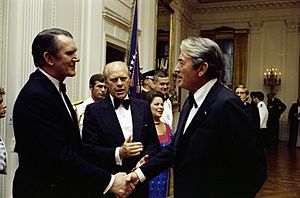
Fraser quickly changed some of the previous government's programs. He made big changes to the health insurance system, Medibank. He tried to control inflation, which was rising. His government also made budget cuts in many areas, including the Australian Broadcasting Corporation (ABC).
Fraser's government faced challenges like rising unemployment and inflation. This was partly due to the worldwide oil crisis of 1973.
World Affairs and Foreign Policy
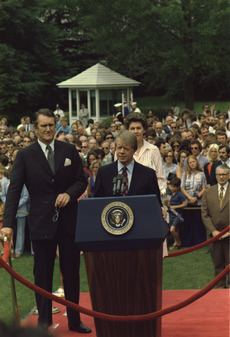
Fraser was very active in foreign policy. He supported the Commonwealth in working to end apartheid in South Africa. He did not allow the South African rugby team to refuel in Australia on their way to New Zealand.
He also strongly opposed white minority rule in Rhodesia (now Zimbabwe). He helped convince British Prime Minister Margaret Thatcher to work towards an independent Zimbabwe.
Under Fraser, Australia recognized Indonesia's control of East Timor. Many East Timorese refugees were given safety in Australia. Fraser also supported the United States and the boycott of the 1980 Summer Olympics in Moscow.
Other Important Policies
Fraser also made big changes to immigration policy. His government allowed more refugees to enter Australia, especially from Asian countries. He strongly supported multiculturalism. He created the Special Broadcasting Service (SBS), which provides multilingual radio and television.
His government also gave Indigenous Australians control of their traditional lands in the Northern Territory.
The 1983 Election and Retirement
In the 1980 election, Fraser's majority in parliament was cut in half. The economy also faced problems.
In 1981, a minister named Andrew Peacock resigned. He accused Fraser of interfering in his work. Peacock then challenged Fraser for the leadership, but Fraser won.
By early 1982, Bob Hawke, a popular Labor politician, was becoming very popular. Fraser planned to call an early election in 1982. But he had a serious back injury.
On 3 February 1983, Fraser went to the Governor-General to ask for a surprise election. However, just hours before, Bill Hayden resigned as Labor leader. This meant the more popular Bob Hawke became the new Labor leader.
At the election on 5 March 1983, Fraser's party was heavily defeated. Fraser immediately announced he would resign as Liberal leader. He formally left the Prime Minister's job on 11 March 1983. He retired from Parliament two months later.
Life After Politics: Malcolm Fraser's Retirement
In retirement, Fraser worked on many international projects. He was Chairman of a UN group on corporations in South Africa. He also co-chaired a Commonwealth group on South Africa. He helped start the aid group CARE in Australia.
Disagreements with the Liberal Party
After 1996, Fraser often criticized the government led by John Howard. He disagreed with Howard's foreign policy, especially its close ties to the United States. He also opposed Howard's policies on asylum-seekers. Fraser supported Australia becoming a republic. He often found common ground with former Labor Prime Ministers Gough Whitlam and Bob Hawke.
In 2009, after Tony Abbott became the leader of the Liberal Party, Fraser left the party. He said it was "no longer a liberal party but a conservative party."
Later Activities
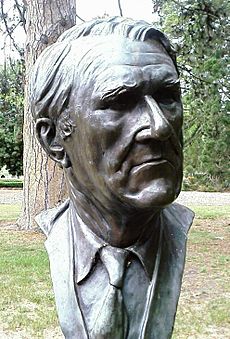
In 2011, Fraser criticized the Australian government's decision to sell uranium to India. His own government had banned sales to countries not signed up to the Nuclear Non-Proliferation Treaty. In 2012, he also spoke against the basing of US military forces in Australia.
In 2013, Fraser supported Australian Greens Senator Sarah Hanson-Young for re-election. He said she was a "reasonable and fair-minded voice."
Fraser wrote books, including Malcolm Fraser: The Political Memoirs (2010) and Dangerous Allies (2014). In Dangerous Allies, he warned about relying too much on the United States.
Personal Life and Family
Marriage and Children
On 9 December 1956, Fraser married Tamara "Tamie" Beggs. They had four children: Mark, Angela, Hugh, and Phoebe. Tamie often helped her husband during his election campaigns. She was seen as outgoing, which balanced his more quiet nature. She advised him on many important decisions.
Religious Views
Fraser went to Anglican schools, but his parents were Presbyterian. In university, he leaned towards atheism. However, his beliefs changed over time to agnosticism. He once said he wished he could believe in God, but his studies in philosophy made it hard.
Death and Remembering Malcolm Fraser
Malcolm Fraser died on 20 March 2015, at age 84, after a short illness. His death came five months after his political rival, Gough Whitlam, passed away.
Many people spoke highly of Fraser after his death. Bob Hawke, who defeated Fraser in 1983, called him a "very significant figure." He praised Fraser for his work on human rights and for welcoming refugees from Indochina. Andrew Peacock, who had challenged Fraser for leadership, said he had "deep respect" for Fraser's early years as Prime Minister.
Fraser was given a state funeral in Melbourne on 27 March 2015. His ashes are buried in the Prime Ministers Garden of Melbourne General Cemetery.
In 2004, Fraser gave his personal papers and library to the University of Melbourne. A street in Abuja, Nigeria, is named after him. In 2018, an Australian election area in Melbourne was named the Division of Fraser in his honour.
Published Works
- Malcolm Fraser: The Political Memoirs (Melbourne: The Miegunyah Press, 2010).
- Dangerous Allies (Melbourne: Melbourne University Press, 2014).
Honours and Awards
Orders
 1977 Companion of the Order of the Companions of Honour (CH)
1977 Companion of the Order of the Companions of Honour (CH) 1988 Companion of the Order of Australia (AC)
1988 Companion of the Order of Australia (AC)
Foreign Honours
 1999 Order of the Three Stars, 3rd Class (Commander)
1999 Order of the Three Stars, 3rd Class (Commander) 2006 Grand Cordon of the Order of the Rising Sun from the Emperor of Japan
2006 Grand Cordon of the Order of the Rising Sun from the Emperor of Japan 2009 Grand Companion of the Order of Logohu (GCL)
2009 Grand Companion of the Order of Logohu (GCL)
Organisations
 2000 Australian Human Rights Commission, Human Rights Medal
2000 Australian Human Rights Commission, Human Rights Medal
Appointments and Degrees
Personal
Fellowships
 Professorial Fellow, Asia Pacific Centre for Military Law at the University of Melbourne
Professorial Fellow, Asia Pacific Centre for Military Law at the University of Melbourne- Vice-President and Fellow of the Royal Commonwealth Society (RCS)
Academic Degrees
 University of South Carolina, Honorary Doctor of Laws
University of South Carolina, Honorary Doctor of Laws Deakin University, Honorary Doctor of the University
Deakin University, Honorary Doctor of the University University of Technology, Sydney, Honorary Doctor of Laws
University of Technology, Sydney, Honorary Doctor of Laws University of New South Wales, Honorary Doctor of Laws
University of New South Wales, Honorary Doctor of Laws Murdoch University, Honorary Doctor of Laws
Murdoch University, Honorary Doctor of Laws
See also
 In Spanish: Malcolm Fraser para niños
In Spanish: Malcolm Fraser para niños
 | George Robert Carruthers |
 | Patricia Bath |
 | Jan Ernst Matzeliger |
 | Alexander Miles |


